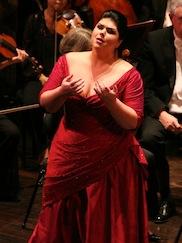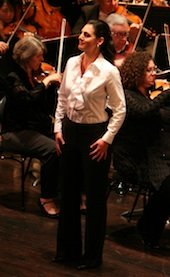
The title, “The Future Is Now,” may well prove prophetic for San Francisco Opera Center’s annual Adler Fellows Gala Concert. If the stars are aligned as they should be, no fewer than four of the artists who took to Herbst Theatre’s stage will soon shine brightly as leading artists at premier houses throughout the world.
It was Opera Heaven-on-Earth when, almost in succession, mezzo-soprano Maya Lahyani and soprano Sara Gartland (both departing second-year Fellows), tenor Brian Jagde (soon to begin his term as a third-year Fellow), and soprano Leah Crocetto (departing third-year Fellow) pulled out all the stops. Crocetto, who has just finished wooing audiences as SFO’s Liù in Turandot, was the most astounding of the lot. Saying farewell to her Adler tenure with the composer with whom she first made her mark at the Merola Opera Gala, Giuseppe Verdi, she joined handsomely voiced baritone Ryan Kuster (first-year Fellow) for the powerhouse scene from Luisa Miller, “Il padre tuo … Tu puniscimi.”
The Stars
In music that allowed her to sing with restraint, Crocetto demonstrated that the enormous reserves she first shared here 3 ½ years ago are not only stronger than ever, but produced with a totally assured, all-encompassing spinto thrust that radiates remarkable warmth. Maintaining beauty of tone throughout by only hinting at the customary darker chest voice in the lowest passages, Crocetto sang (in translation) “You have torn my heart into tiny pieces, you evil man! ... Let my father’s hand close my eyes” with the heart-seizing command and eloquence of her greatest predecessors.
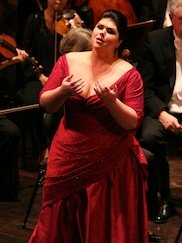
Crocetto’s performance was so thrilling that the extremely knowledgeable audience could not help but break into applause even before the extremely demanding soprano cabaletta had begun. A decade hence, expect those who heard her last night, or at her equally flawless Salon at the Rex recital a few months back, to exclaim to their friends, “I heard her back when!”
In Didon’s “Je vais mourir” from Berlioz’ Les Troyens, and as Octavian in the “Mir ist die ehre” duet from Richard Strauss’ Der Rosenkavalier with soprano Nadine Sierra (first-year Fellow), Lahyani conveyed such out-of-the-box sentiment as to bring to mind the great Brigitte Fassbaender. Didon’s words “eternelle nuit” were voiced memorably, the entire scene presented with such fine gradations of volume and tone that it served as an example of opera at its finest. Even if the San Francisco Opera Orchestra, under the sometimes sonnambulant hand of SFO Resident Conductor Giuseppe Finzi, died at the end — things were far worse in the Rosenkavalier duet, where Finzi offered nary a whiff of perfumed romance — Lahyani achieved greatness.
Gartland is a star through and through. Her slightly hard soprano, with its glamorous, sumptuous top, may not be ideally suited for Donizetti’s Norina (her other concert assumption) or Bizet’s Micaela (in SFO’s current Carmen), but she was stunning, both vocally and physically, in Massenet’s “Me voilà seule … Dis-moi que je suis belle” from Thaïs. Beautifully floating some of her softer notes, and setting her highs afire, Gartland was sensational.
Jagde supplied what so many other tenors on today’s main stage lack: soul. Totally assured throughout his range, with the essential expanse of volume on top that Ramon Vargas lacked in SFO’s recent production of Massenet’s Werther, Jagde’s “Toute mon àme est là ... pourquoi me réveiller?” had all the gravity and weight to make Werther come alive. Although his vocal production is not (at this point) flawless, Jagde made me believe in his singing.
Abundant Gifts
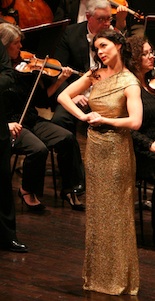
Baritones Kuster and Ao Li (another first-year Fellow) showed tremendous promise. Neither as yet has the commanding volume and authority required for the leading roles of Figaro and Wurm (Kuster), or the character roles of Dandini and Malatesta (Li). Nonetheless, their beautiful voices and intelligent phrasing, well schooled by coaches Tamara Sanikidze (departing second-year Fellow) and David Hanlon (first-year Fellow) evidenced full understanding of what is needed to put these roles over the top. Li’s coloratura is especially fine, and his facial expressions droll if still a bit constrained. And although he pushed a bit on top, Kuster’s fine control of tonal variation showed great intelligence.
Sopranos Sierra and Susannah Biller (departing second-year Fellow) have such beautiful voices that it’s a shame that they weren’t showcased in music better suited to their current levels of proficiency. Although Sierra’s soft highs as Donizetti’s Lucia in “Regnava nel silenzio” were very special, she sang too carefully to convince. In particular, her slower coloratura descents were voiced too self-consciously, and came across as rather pedestrian steps. When she ascended to the top of her range, the sound was gorgeous, but there was no rapture.
If the same could be said of her Sophie in the far too zippy Rosenkavalier excerpt from the Presentation of the Silver Rose, much of the fault lay with Finzi. Refusing to let the music bloom, he left no room for Sierra to express youthful fragility, and nipped her gorgeous highs in the bud. He also allowed the evening’s one true coloratura, the gleaming voiced and immensely gifted Biller, to fall flat in Zerbinetta’s treacherously difficult “Grossmächtige prinzessin.” Lacking all trace of insouciance, too many phrases plodded along without any over-arching conception of the aria’s development. Even Biller’s attempts to inject play into the proceedings failed to elicit a smile from the usually eloquent orchestra.
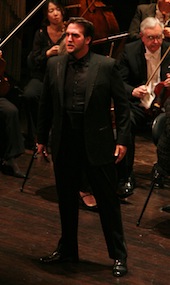
The conductor also zipped through Crocetto’s potentially exquisite “Giusto ciel” from Rossini’s Maometto II. Despite the soprano’s flawless, jaw-dropping two-octave leap midway through, the music moved far too fast to allow hearts to open. Finzi also drained all poetry from the “Instant charmant … en fermant les yeux” of tenor Daniel Montenegro (departing second-year Fellow). The strict-time recitative was prosaic, the dismayingly metronomed aria far from dreamy. Montenegro’s darkened tone seemed far more suited to Gounod’s “Ah, lève toi soleil!,” which was marred only by a few tentative highs.
Biller all but ate up smaller voiced countertenor Ryan Belongie in their duet from Handel’s Theodora. Why didn’t she sing with restraint? Left to his own devices, Belongie presented a fine if hardly spectacular “Oh patria … Di tanti palpiti” from Rossini’s Tancredi.
The evening ended as it began, with Rossini’s Guillaume Tell. Herbst Theatre’s somewhat improved acoustics may still make hash of upstage percussion, but they allowed the downstage strings to shine in the overture. The thrilling finale brought all singers forward, and the audience to its feet.

